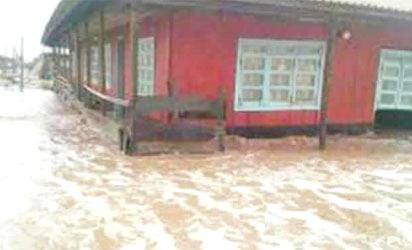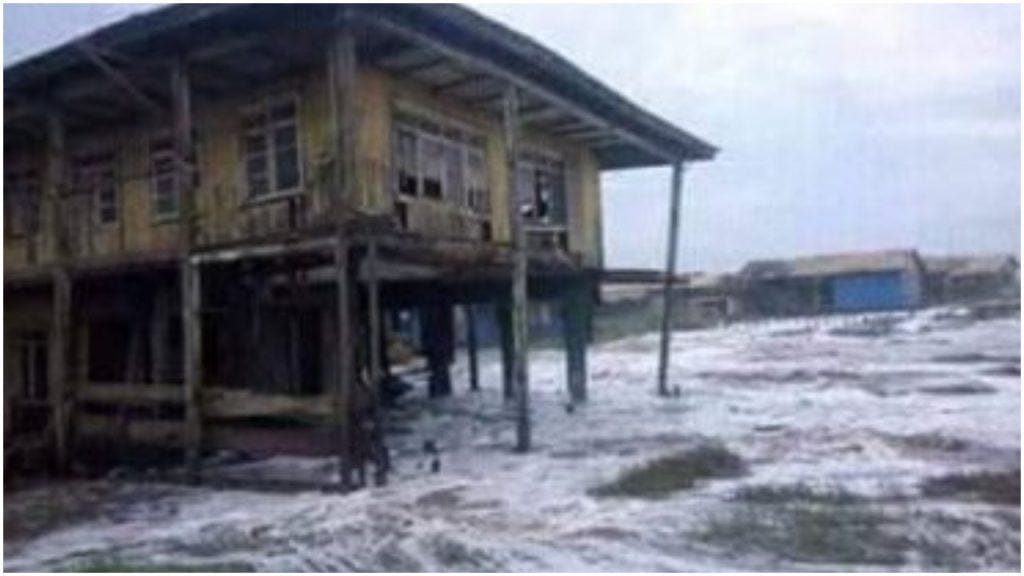Climate Change: Portrait of cities as Endangered Species
How does it feel when cities are on the verge of sinking into the ocean? How does it feel when people lose their jobs due to an advancing ocean? Read this, and find out how it feels.
For Bunmi Oladele, last year was a season of poverty. It was a season of declining fish sales. Between June and September, the Atlantic Ocean poured water upon the oil-rich Ayetoro in Ondo State of Nigeria, adding land submergence, flooding, and washed-away houses to a season of inflation, poverty, and declining fish yields.
Betty Aina lived at Awoye, a few kilometers from Ayetoro, a town facing the Atlantic Ocean. She planted cassava, she planted yam. When the flood from the Atlantic Ocean arrived, it washed her farm away, and it was impossible to believe that Betty ever planted cassava or okra or yam on her farm.
Surges from the Atlantic Ocean have made life nasty, brutish and short for people like Bunmi and Betty. Sea surges come with the speed of light. They come with the noise of thunder. They come without warning. Of course, Betty and Bunmi’s mothers gave birth to them in this violent area, but they never believed they would witness a day when surges come with this speed of light, with this noise of thunder, come with this disaster without warning. It began with the rising heat in the land. It's climate change all over again.
It’s climate change because the sea now rises against the land. It’s climate change because the ocean has become more turbulent. It’s climate change because the roars now sound louder. People like Betty and Bunmi knew about the anger of the ocean in the past, but after reading newspapers, after hearing men talk in the beer parlors in their communities, seeing the ocean become more turbulent, seeing the ocean rising against the land, seeing what they had lost, they know they face a new anger - climate change.
Ayetoro used to have a beach in the past, with children playing on it. Trees lined the ocean front in the past. People plucked fruits from the trees, things like coconut. Ayetoro used to have houses close to the ocean in the past. People slept in the past with their eyes closed, not frightened by the ocean. But with the advance of the ocean, which coincided with the rise in temperature in Nigeria, it sounds incredible, but no one would believe in the past the town used to have a beach, coconut trees, used to have houses close to the ocean. The ocean swallowed all these landmarks.
Credit: Vanguard Newspaper
Bunmi also works as a fish monger. Years ago, when she was young, her mother introduced her into the world of fish mongering. The ocean provided fish. The ocean provided prawns. Then, with the onset of climate change, a situation complicated by oil exploration from firms such as Chevron, Agip, and others, things changed in a dramatic fashion, and the ocean no longer provided fish, no longer provided prawns, no longer provided crabs. Due to the changes in climate, these aquatic creatures sought for less warm areas.
Before, farms abounded in the area surrounding the towns of Ondo State facing the Atlantic Ocean. The men used to have a saying; “My grandfather is a farmer.” The boys used to have a saying: “My father is a farmer.” The girls used to have a saying, “My mother is a farmer.” Then came climate change complicated by oil exploration. The farms disappeared. The crops disappeared. The shrubs disappeared. Today, it’s difficult to hear people say, “My grandfather was a farmer," “My father is a farmer,” "My mother is a farmer.”
The beach vanished, the playgrounds vanished, the farms vanished. So how did the people cope with the beach and farms and playgrounds having vanished? Some could not take it. They had to emigrate to other places. Some had to get farms in other places. Within a decade, those who emigrated to other places or got farms in other places or fished in other places totaled 20,000. If the climate change continues, the Atlantic Ocean will submerge Ayetoro, and the people would only have fond and regretful and wishful memories of a town where people once lived but had now vanished to other places.
Credit:Daily Post
Some could have coped if fish remained plentiful. It would have been easier if the fish remained plentiful. Then people could relocate to somewhere near and continued fishing the plentiful fish. But climate change warmed the Atlantic Ocean, and to look for colder waters, fish moved away, and the fish no longer became plentiful. So now that fish is no longer plentiful, the business of fishing crumbled, meaning problems now exist, and things have become hard, so hard unemployment plagues many fishermen.
Unemployment not only faces inhabitants of the town, they also face the loss of their history, their heritage, the loss of their yesterdays. The men in the town grieve over the loss of their past. The women in the town grieve. The children also grieve. The ocean surges swallowed their cemetery, their monuments, swallowed the mementos, so when men and women and children remember the loss of their cemetery and mementos and their monuments, they have no choice than to grieve.
Other people grieve. So many people have left Ayetoro. So many people have stopped farming. So many people have stopped fishing. The remaining people, when they remember the so many people who have left, the so many people who have stopped farming, the so many people who have stopped fishing, they bow down their head with unhappiness. The situation fills them with sadness. It fills them with pains. It fills them with grief, because the meaning of the situation is that the town is dying, with the dying town having little chance of survival, and the only thing to do is to wallow in sadness and pains and grief.
Even if the town survives, life will remain harsh. Already, people face the challenge arising from water. Or put in another way, they face a challenge from lack of good water. Or put in another way, they face the challenge of having to buy and drink and use expensive water because they lack drinkable water. The challenge began when the Atlantic Ocean, fuelled by climate change, poured into the communities, mixing its salt water with the town’s fresh water supplies. Life can never be easy for inhabitants facing challenges from numerous places: the challenge of having to drink salty water, the lack of water, or the challenge of buying expensive water.
Credit: The Newstrack
Unfortunately, neighbors surround Ayetoro. Apart from family and business and marriage ties, land ties Ayetoro and its neighbors. Once Ayetoro gets submerged into the sea, Ugbo may get submerged, Awoye may get submerged, Ugbonla may get submerged. In truth, these towns are contiguous to each other, and when Ayetoro goes, one won’t be surprised if Ugbo goes, if Awoye goes, if Ugbonla also gets submerged. In other words, many towns stand to get submerged into the ocean in the near future as effects of climate change make sure Ayetoro gets submerged.
How do we stop the submergence of these towns? How do we stop the submergence of other towns? How do we stop the pain of thousands of people? The climate change effects get stronger with every passing day, and experts predict Nigeria’s temperature will rise in the next fifty years, so how do we stop the submergence of these towns and stop the cries of fishermen and stop the pains of thousands of people from rising?
Fortunately, The International Energy Agency released a report stating how the world could still meet its Paris agreement of preventing a 1.5% rise in global temperature. “As the major source of global emissions, the energy sector holds the key to responding to the world’s climate challenge,” the report said.
In other words, the energy sector must accelerate towards renewable energy, accelerate towards electronic vehicles, accelerate towards energy-efficient retrofits. But not just that, as the sector must also respond towards reducing its carbon emissions or it accelerates the planet towards the path of danger. However, Big Oil ignores the impending dangers. Though Exxon hopes to reduce its business in Nigeria, it refuses to pay remediation charges on the equipment it sold, placing a future generation in problems, an indication that it ignores or avoids discussions or acts in a nonchalant way towards the impending dangers.
Credit: The Hope Newspapers
But it isn’t the only culprit. While places like Ayetoro sink into the Atlantic Ocean over climate change, politicians talk about building modular refineries. Nigerian newspapers celebrate the building of giant refineries. Others in other parts of the world clap their hands over the building of yet more refineries. As they talk and celebrate and clap their hands over the building of refineries, they act like energy companies, accelerating the world towards impending dangers, in this frenzied desire to build refineries.
But a solution exists, because everyone says one of the key factors to the solution is through people’s power, a very potent weapon. People’s power expressed itself through the September 2019 climate strikes, also known as the Global Week for Future. People’s power showed itself through the protest against climate change's impact amid flooding in the Muara Angke Port area in Jakarta, Indonesia. People’s protests show when men and women and children protest against the building of mines in Sweden. Even though, according to the International Energy Agency, individual behavioral changes will only account for around 4% of cumulative emissions reduction in the path towards net zero, humanity expressing itself through people’s power can take a stand as people did at the Muara Angke Port area of Jakarta and as they should take a stand at places like Ayetoro.
For this to happen, victims like Bunmi should tell their travails to everybody in the world. Victims like Betty should launch campaigns all over the place. Victims of economic loss through climate change should shout it out. When Bunmi, Betty, and victims of economic loss shout out the challenges caused by climate change, then world leaders and Big Oil would be forced to make correct environmental choices, and perhaps redirect their energies towards change, based on the shouts and campaigns and experiences of victims. The campaign should be a continued outrage against the powerful. It should be a ceaseless struggle with the powerful. It should be a constant fight with the powerful. People should be asking governments and Big Oil and other related corporations – the group that forms the powerful structure – to do something right about climate change, put in place the right policies, make the right choices. Campaigns by victims of climate change coupled with campaigns of outrage at the powerful to make the right choices and campaigns by those who believe in the use of people’s power should be the right global choice in the struggle towards a clean planet.









when i check google maps it appears that Ayetoro is 60 miles from the ocean / how could this flooding happen so far away from the ocean ??
oh no !! has the flooding subsided ?? you paint a dire picture of Ayetoro